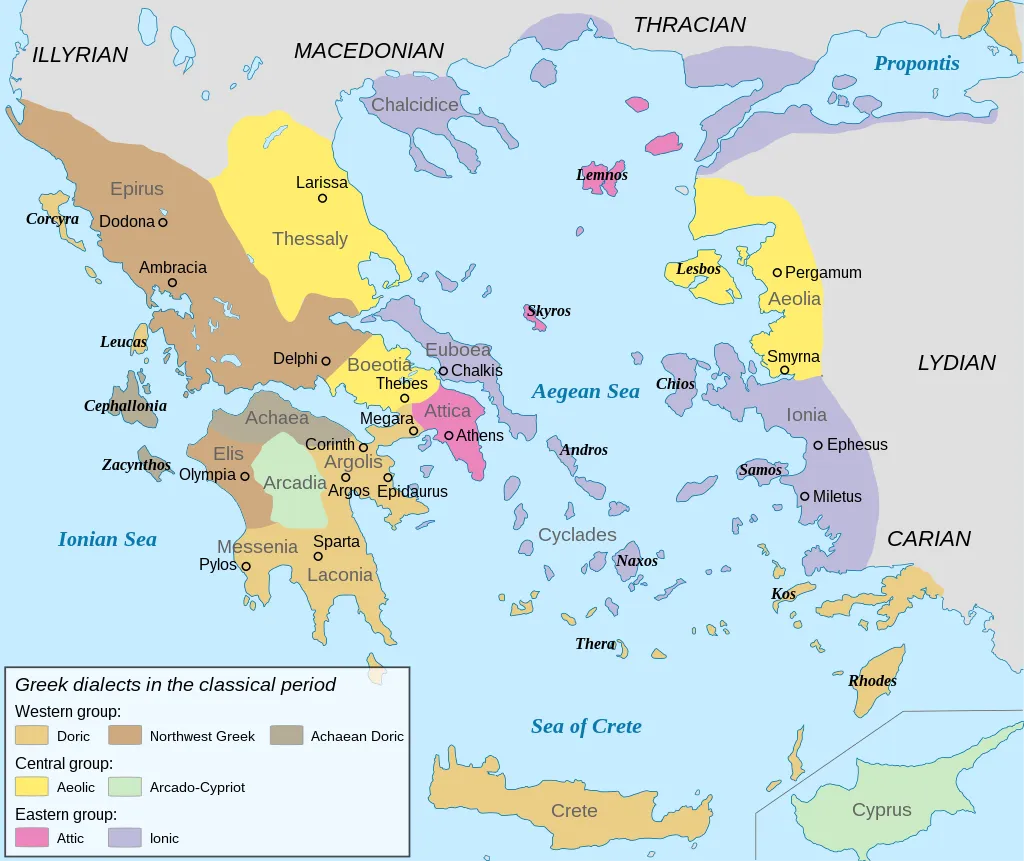 ▲ the Dorian invasion
▲ the Dorian invasion
The Dorian invasion is a concept devised by historians of Ancient Greece to explain the replacement of pre-classical dialects and traditions in southern Greece by the ones that prevailed in Classical Greece. The latter were named Dorian by the ancient Greek writers, after the Dorians, the historical population that spoke them.Greek legend asserts that the Dorians took possession of the Peloponnesus in an event called the Return of the Heracleidae (Ancient Greek: Ἐπιστροφὴ τῶν Ἡρακλειδῶν). Nineteenth-century Classical scholars saw in the legend a possibly real event they termed the Dorian invasion. The meaning of the concept has changed several times, as historians, philologists and archaeologists used it in attempts to explain the cultural discontinuities expressed in the data of their fields. The pattern of arrival of Dorian culture on certain islands in the Mediterranean, such as Crete, is also not well understood. The Dorians colonised a number of sites on Crete such as Lato.[1]
Despite nearly 200 years of investigation, the historicity of a mass migration of Dorians into Greece has never been established, and the origin of the Dorians remains unknown. Some have linked them or their victims with the emergence of the equally mysterious Sea Peoples. The meaning of the phrase "Dorian invasion" as an explanation for the cultural and economic breakdown after the Mycenaean period has become to some degree amorphous. Investigations into it have served mainly to rule out various speculations, though the possibility of a real Dorian invasion remains open.
The collapse of the Mycenaean civilization due to The Dorian invasion ended the Mediterranean Bronze Age and the Iron Age began.
Ancient Greek historians and literary figures described The Dorian invasion as the return of Hercules' descendants.
In my opinion, Europeans in the 19th century presume to compare the Jewish exodus and the Germanic great migration to The Dorian invasion.
There are many arguments for the cause of the fall of the Mycenaean civilization, but The Dorian invasion was definitely a literary fabulous subject.
@valued-customer speculates that the Dorian invasion occurred due to changes in solar temperature.
There are several arguments for the cause of the destruction of the Mycenaean civilization.
By the way, for simplicity of view, I will describe The Dorian invasion as the cause of Mycenaean destruction.
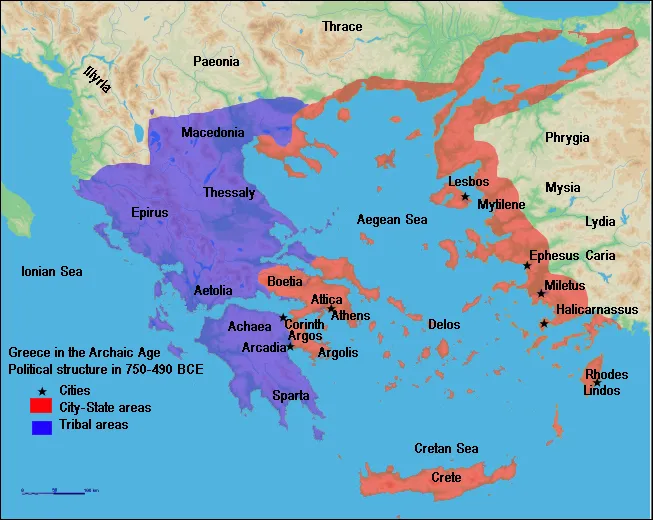 ▲ Classical Greece (5th and 4th centuries BC)
▲ Classical Greece (5th and 4th centuries BC)
The Greek Dark Ages, Homeric Age[citation needed] (named for the fabled poet, Homer) or Geometric period (so called after the characteristic Geometric art of the time),[1] is the period of Greek history from the end of the Mycenaean palatial civilization around 1100 BC to the first signs of the Greek poleis (city-states) in the 9th century BC.The archaeological evidence shows a widespread collapse of Bronze Age civilization in the Eastern Mediterranean world at the outset of the period, as the great palaces and cities of the Mycenaeans were destroyed or abandoned. At about the same time, the Hittite civilization suffered serious disruption and cities from Troy to Gaza were destroyed and in Egypt the New Kingdom fell into disarray that led to the Third Intermediate Period.
Following the collapse, fewer and smaller settlements suggest famine and depopulation. In Greece, the Linear B writing of the Greek language used by Mycenaean bureaucrats ceased and the Greek alphabet would not develop until the beginning of the Archaic Period. The decoration on Greek pottery after about 1100 BC lacks the figurative decoration of Mycenaean ware and is restricted to simpler, generally geometric styles (1000–700 BC).
It was previously thought[by whom?] that all contact was lost between mainland Hellenes and foreign powers during this period, yielding little cultural progress or growth, but artifacts from excavations at Lefkandi on the Lelantine Plain in Euboea show that significant cultural and trade links with the east, particularly the Levant coast, developed from c. 900 BC onwards. Additionally, evidence has emerged of the new presence of Hellenes in sub-Mycenaean Cyprus and on the Syrian coast at Al-Mina.
With The Dorian invasion, Greece fell into the dark ages.
Since there was no historical record of this era, Homer and Hesiod simply wrote that it was a myth era.
The period that the ancient Greeks called the Age of Myth was, from the modern man's point of view, the period when the gods and heroes committed murder, war, looting, arson, assassination, and rape.
Perhaps Homer and Hesiod claimed to be an age of myth because they wanted to hide the age of such savagery.
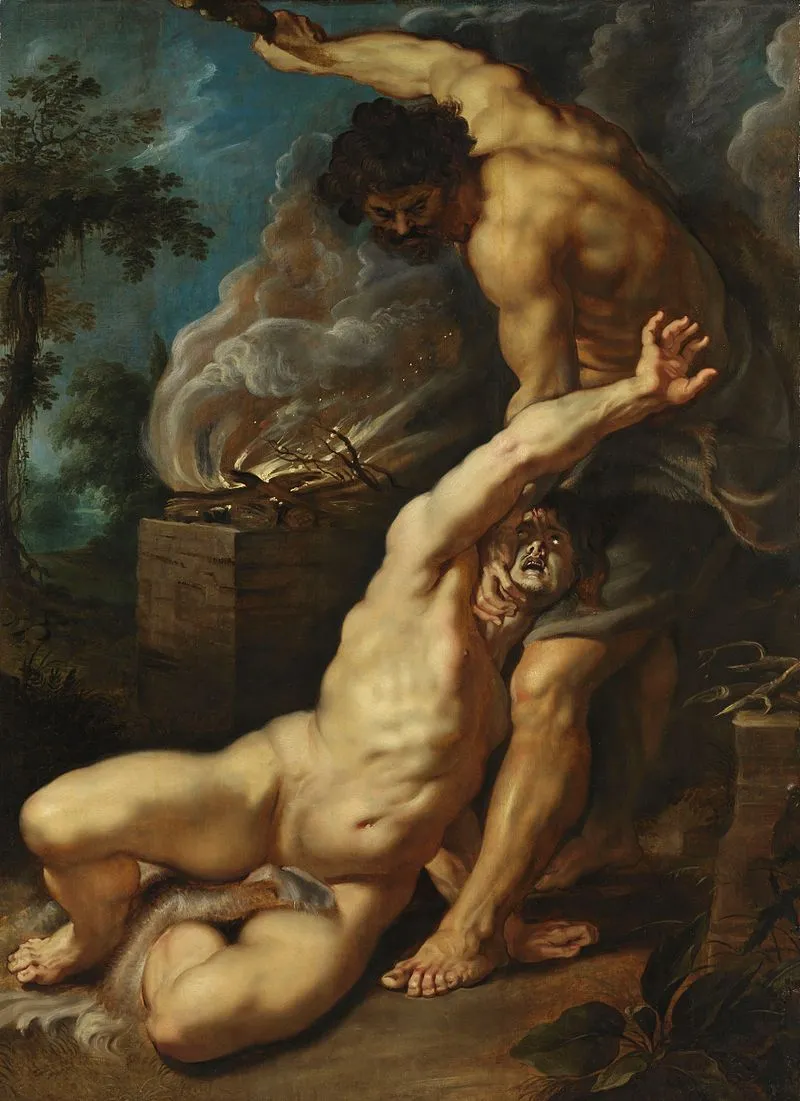 ▲ Cain_and_Abel
▲ Cain_and_Abel
Greek gods and heroes were probably like Cain and Abel and the Barbarians who invaded Rome.
However, an unusual fact is that even humans who have become barbarians can achieve revolutionary development and evolution.
The barbarians created an iron civilization, just as all the children of the women whom Zeus raped became kings and queens.
Cain's descendants who killed Abel created the golden age of classical Greek civilization.
From the 8th century BC, classical Greek civilized nations such as Athens, Sparta, Thebes and Macedonia were constructed.
From now on, let's move to ancient China.
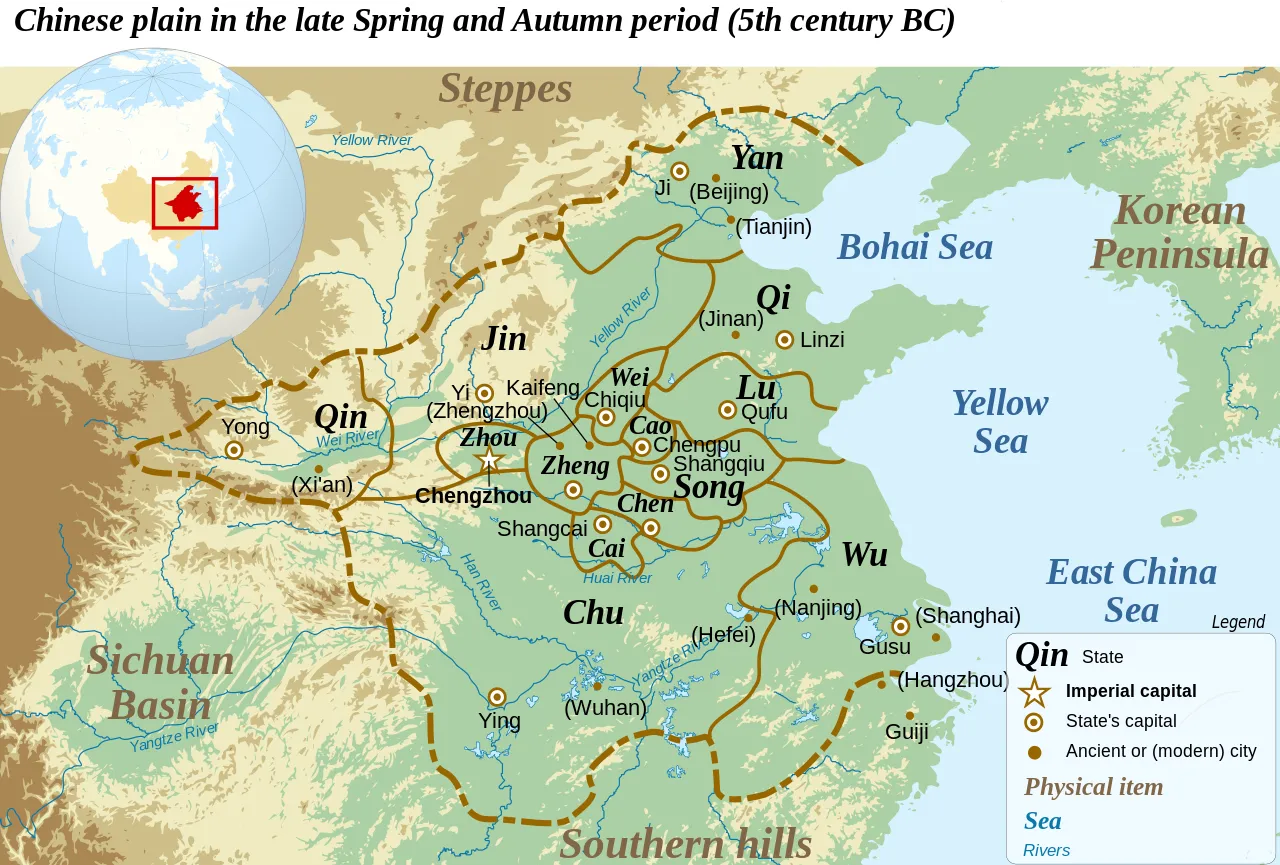 ▲ Spring and Autumn period !
▲ Spring and Autumn period !
In 771 BC, the Quanrong invasion destroyed the Western Zhou and its capital Haojing, forcing the Zhou king to flee to the eastern capital Luoyi (Chinese: 洛邑). The event ushered in the Eastern Zhou dynasty, which is divided into the Spring and Autumn and the Warring States periods. During the Spring and Autumn period, China's feudal system of fengjian (封建) became largely irrelevant. The Zhou court, having lost its homeland in the Guanzhong region, held nominal power, but had real control over only a small royal demesne centered on Luoyi. During the early part of the Zhou dynasty period, royal relatives and generals had been given control over fiefdoms in an effort to maintain Zhou authority over vast territory.[3] As the power of the Zhou kings waned, these fiefdoms became increasingly independent states.
In 771 BC, after the fall of The Western Zhou (Chinese: 西周; pinyin: Xīzhōu; c. 1045-771 BC) due to the invasion of the Quanrong, Spring and Autumn period(Chinese: 春秋 時代 771 to 476 BC or according to some authorities until 403 BC) began.
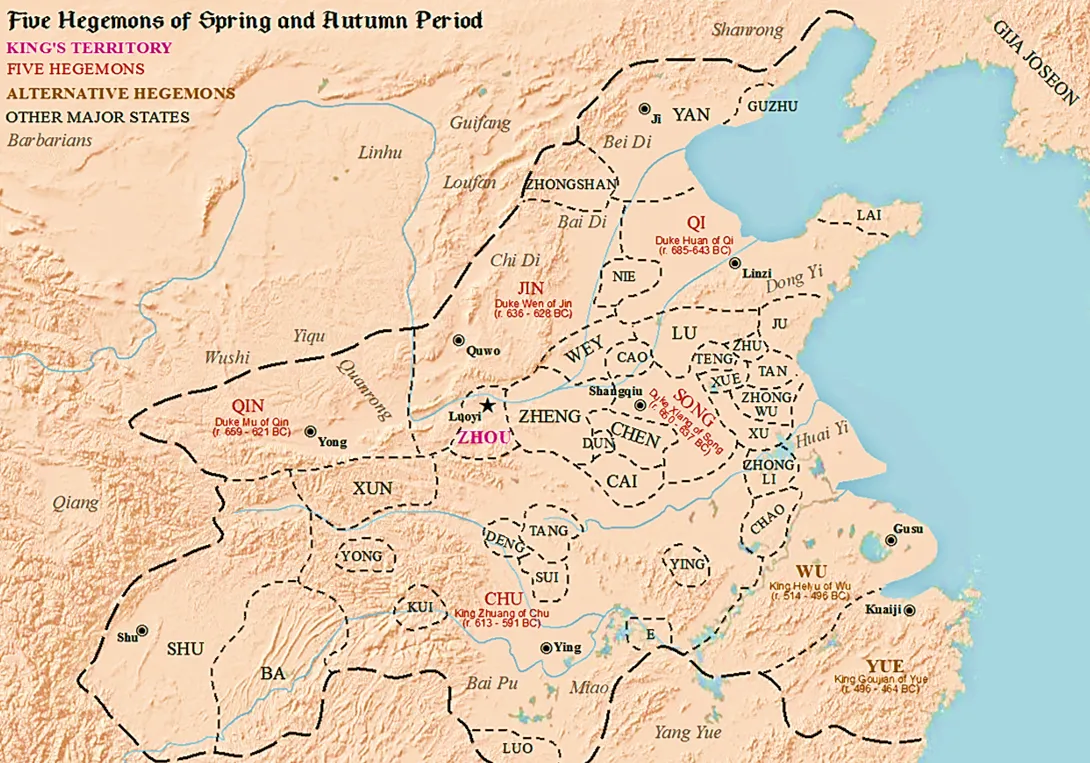 ▲ Map of the Five Hegemons during the Spring and Autumn period of Zhou Dynasty
▲ Map of the Five Hegemons during the Spring and Autumn period of Zhou Dynasty
The Five Hegemons (Chinese: 五霸; pinyin: Wǔ Bà) refers to several especially powerful rulers of Chinese states of the Spring and Autumn period of Chinese history (770 to 476 BCE), sometimes alternatively referred to as the "Age of Hegemons". There are various lists of five hegemon rulers of those certain states which rose to power over the other states of this time period, states which were also formed during the period of dissolution of a once real and strong central state, namely the empire of the Zhou dynasty. The Hegemons mobilized the remnants of the Zhou empire, according to shared mutual political and martial interests. An especially prominent Hegemon was Duke Huan of Qi.
China was divided and more than 140 countries were born. They fought countless wars to gain supremacy.
It was similar to the situation of Greek civilization after the fall of Mycenaean civilization, except that China was still in the Bronze Age.
Chinese warlords conquered and expanded through the war.
Conquering neighboring countries, great powers emerged.
Powers gained or lost hegemony according to changes in times and circumstances, with the five being the strongest.
Chinese historians called them The Five Hegemons (Chinese: 五霸; pinyin: Wǔ Bà).
The Five Hegemons (Chinese: 五霸; pinyin: Wǔ Bà) competed for supremacy like Athens, Sparta, Thebes and Macedonia.
Through the competition and alliance of The Five Hegemons (Chinese: 五霸; pinyin: Wǔ Bà), the ancient Chinese world expanded and developed.
Chinese and Greek civilizations of the same time are similar, as if viewing a parallel universe.
When comparing Chinese civilization to Greece, we found many interesting facts.
I want to describe it more, but it was difficult because my English was poor.
So, I keep asking for your interest and support.😄
